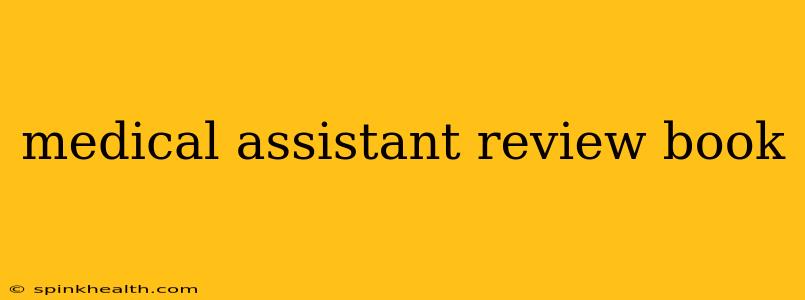So, you're gearing up for your medical assistant certification exam? The feeling is probably a mix of excitement and, let's be honest, a little anxiety. Navigating the vast world of medical terminology, procedures, and regulations can feel overwhelming. But don't worry, you've got this! This guide acts as your ultimate review book companion, helping you conquer the exam with confidence. Think of it as your secret weapon, a roadmap to success.
What Makes a Good Medical Assistant Review Book?
Choosing the right review book is crucial. You need a resource that's more than just a list of facts; it needs to be a learning experience. A great review book should:
- Cover all the essential topics: This includes medical terminology, anatomy and physiology, administrative and clinical skills, legal and ethical considerations, and more. Think of it as a comprehensive toolkit for your medical assistant career.
- Provide practice questions: These are invaluable for identifying your weak areas and getting comfortable with the exam format. Think of practice questions as your training drills before the big game.
- Offer clear explanations: Complex medical concepts should be explained in a way that's easy to understand, even if you're new to the field. Clarity is key!
- Include realistic scenarios: Many books incorporate case studies and real-world examples to help you apply your knowledge. This is crucial for understanding how medical practices operate.
- Be updated regularly: The medical field is constantly evolving, so ensure your review book reflects the latest information and guidelines.
Choosing the Right Review Book for YOU
There's no one-size-fits-all answer here. The best review book depends on your learning style and current knowledge level. Some prefer concise summaries, while others thrive with detailed explanations and practice exercises. Do your research, read reviews, and maybe even peek inside a few books before making your final decision.
How to Effectively Use Your Review Book
Don't just passively read your review book; actively engage with the material. Here's a strategy for success:
- Create a study schedule: Break down the material into manageable chunks and allocate specific time slots for studying. Consistency is key.
- Use active recall techniques: Instead of simply rereading, try testing yourself on the material regularly. Flashcards, practice quizzes, and even teaching the material to someone else can be helpful.
- Focus on your weaknesses: Once you identify areas where you struggle, dedicate extra time to mastering those concepts.
- Simulate exam conditions: Take practice exams under timed conditions to get comfortable with the pressure and pacing of the real exam.
- Don't be afraid to seek help: If you're struggling with a particular topic, don't hesitate to seek help from a tutor, professor, or mentor.
What Topics Should I Focus On?
This is where your chosen review book becomes your guide, but here are some common areas that often challenge medical assistant students:
What are the key administrative duties of a medical assistant?
Administrative tasks are a significant part of the job. Expect questions on scheduling appointments, managing patient records (including electronic health records or EHRs), handling insurance claims, and maintaining the office's general organization.
What are the key clinical duties of a medical assistant?
Clinical duties might include taking vital signs, assisting with examinations, preparing patients for procedures, performing basic lab tests, administering medications (under supervision), and sterilizing instruments. Proficiency in these areas is essential.
What are the legal and ethical considerations for medical assistants?
Medical assistants must adhere to strict legal and ethical guidelines regarding patient confidentiality (HIPAA), record keeping, and professional conduct. Understanding these principles is vital to ethical and safe practice.
What are some common medical procedures I should be familiar with?
Your review book should cover common procedures like electrocardiograms (ECGs), phlebotomy (drawing blood), injections, and wound care. Understanding the steps and precautions involved is important.
How can I prepare for the practical portion of the exam?
Many medical assistant exams include a practical component. Use your review book to understand the skills you need to demonstrate, and practice those skills until you're confident and efficient.
Remember, You've Got This!
Preparing for your medical assistant exam can seem daunting, but with a well-chosen review book and a dedicated study plan, you'll be well-equipped to succeed. Remember to stay positive, stay organized, and celebrate your progress along the way. Good luck! You've got this!

